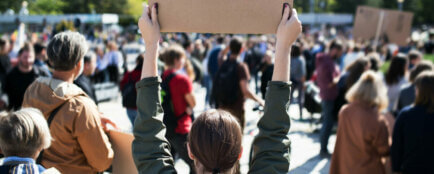Personal freedom is a fundamental human right protected by international conventions and Czech law itself. Restriction or deprivation of personal liberty can only occur under clearly defined conditions. In this article, we will focus on the restriction of personal liberty from the perspective of civil and criminal law, its definition, the situations in which we can encounter this phenomenon, and we will introduce possible legal tools that victims can use to defend themselves.
What is personal freedom?
Personal freedom is a fundamental right guaranteed to every person by the Charter of Fundamental Rights and Freedoms. According to Article 8(1) of the Charter, no one may be deprived of his or her liberty except on the grounds laid down by law and by a court decision. Criminal law distinguishes between restriction of personal liberty (short-term restriction of movement) and deprivation of liberty.
Restriction of personal liberty differs from deprivation of liberty, which involves a long-term and difficult restriction of movement (e.g. imprisonment following a conviction). Restraint can be short-term and less intense, such as locking a person in a room or physically restraining them.
Actions that could lead to the restriction of personal liberty through psychological or physical coercion are also prohibited by Act No 3/2002 Coll. on Churches and Religious Societies.
How do we define the restriction of personal liberty?
The definition clearly specifies restriction of personal liberty as an act that restricts the movement of an individual without authorisation or legal reason. The most common forms of restriction of personal liberty include physical restraint, psychological coercion and/or abuse of power.
So, if your partner in a fit of rage, for example, locks you in a room and prevents you from moving freely, they are already committing a restraint of your personal liberty. Likewise if he or she threatens you in order to force you to do something. But the police can also commit a violation of personal liberty if they abuse their power and arrest you unjustifiably.
Do you feel that someone has overstepped your boundaries? Are you being restrained by a neighbour, partner or employer? CCTV, threats or physical detention are not okay and interfere with your personal freedom.
Are you solving a similar problem?
Your freedom can be our priority
Do you feel that someone has crossed your boundaries? Are you being restricted by a neighbour, partner or employer? CCTV, threats or physical detention are not okay and interfere with your personal freedom. Don’t wait for the situation to escalate. Our legal services are here to find a tailored solution.
- When you order, you know what you will get and how much it will cost.
- We handle everything online or in person at one of our 6 offices.
- We handle 8 out of 10 requests within 2 working days.
- We have specialists for every field of law.
What does the restriction of personal liberty look like in practice?
A typical situation in which personal freedom is restricted is a dispute between neighbours. This occurs, for example, when neighbours deliberately lock a common corridor or front door, even though this is contrary to the house rules.
Restrictions on personal liberty are also often dealt with by the police when a landowner prevents another owner from accessing his property. For example, he or she decides to erect a fence on his or her property, but it prevents access to the other owner’s property. These disputes often end up going to court.
Another example might be when neighbors install a camera system that inappropriately monitors your movements. Although this is to protect your property, it can infringe on your right to privacy and freedom of movement. Even in such cases, you can take legal action to resolve the situation. If you need an attorney or help filing a lawsuit, we are happy to provide our expertise and services.
However, we must not forget to mention the restriction of personal freedom in a relationship. Toxic relationships often bring about many situations where this act occurs. It is not okay if one partner is stalking the other partner, restricting their contact with family or friends. Likewise if he or she prevents him or her from leaving the home, locks the door or confiscates personal items (such as the phone).
The line between restriction of personal freedom and relationship abuse is very narrow. If any harm is happening to you, do not be afraid to contact the police or even us directly.
Another form can be manipulation, where one partner prevents the other from attending work, restricting their independence and movement. You can also seek help in such cases at a domestic violence intervention centre.
What is the penalty for restricting personal freedom?
An offender who commits the offence of restraint of liberty risks a prison sentence of up to two years. However, if he or she combines the restraint of personal liberty with an intention to facilitate another offence, he or she faces up to three years’ imprisonment.
In addition, victims of unlawful restraint have the right to compensation for the harm caused. This includes both material damage (e.g. loss of income) and non-material damage (e.g. psychological trauma). In the case of serious bodily harm, the court may impose an even higher financial penalty on the perpetrator, as the victim has a significantly higher claim to compensation.
The law enforcement authorities must also distinguish whether the offender has committed a criminal offence or only a misdemeanour when dealing with restrictions on personal liberty. An offence is a minor breach of the law which does not cause serious harm (for example, deliberately locking a neighbour in the hallway of a house, which did not result in physical harm or serious psychological consequences). In the case of a criminal offence, it is already a serious violation of the law that has caused or could have caused serious consequences (for example, the long-term detention of a partner against his or her will).
Restrictions on personal liberty also have serious consequences for the victim
Unlawful restrictions on personal liberty can lead to serious psychological consequences. Among the most common are post-traumatic stress disorder (PTSD), anxiety, depression and other mental disorders.
In addition, victims of unlawful deprivation of liberty may face social stigmatisation and isolation. They may have difficulty reintegrating into society and forming relationships, which can further impair their mental health and overall quality of life. The courts must therefore take these aspects into account when sentencing offenders for this offence.
When is it legal to restrict personal liberty?
In some cases, restrictions on personal liberty may be legal. The most common reasons when this occurs are clearly defined by law. The main reasons include:
- Legal confinement following a conviction: a person may be restricted in their personal liberty as a result of a final judgment of a court that has sentenced them to imprisonment. This ground is enshrined in the Criminal Code and includes both punitive and protective measures
- Arrest of a person suspected of a crime: The police have the right to detain a person who is suspected of committing a crime in order to ensure his presence during the investigation or to prevent further criminal conduct. This procedure must be carried out in accordance with the law and under the conditions laid down
- Custody: This form of restriction of personal liberty is applied in cases where there is a fear that the accused may abscond, influence witnesses or otherwise obstruct the investigation. The Code of Criminal Procedure distinguishes between different types of detention (escape, collusion and pre-trial detention) and each has its own specific conditions
- Protection of the public: in some cases, personal liberty may be restricted for the protection of the public, for example for persons who pose a threat to others or to themselves. This reason may include situations such as the detention of mentally ill individuals.
- Detention of foreign nationals: persons who are not authorised to reside in the Czech Republic or who are subject to expulsion or extradition proceedings may also be subject to restrictions on their personal liberty. These measures are regulated by specific laws on the residence of foreigners and asylum.
How can I defend myself against restrictions on my personal liberty?
If you have been a victim of a restriction of your personal liberty, there are several legal tools you can use:
- A criminal complaint – you can file this with the police or the public prosecutor’s office. We will be happy to help you with this. The police will launch an investigation and assess whether the conduct meets the elements of a criminal offence under Section 171 of the Criminal Code.
- Civil action – through our office you can also file an action for protection of personality under Section 81 of the Civil Code (if there has been an interference with the right to liberty or human dignity).
- Compensation – as a victim who has suffered material or non-material damage, you can claim compensation.
So, for example, if a neighbour has wrongfully detained you in your garage over a parking dispute, you may be entitled not only to a criminal settlement but also to compensation for the harm caused. Contact us and we can help you sort out the whole situation so that you get your right and get what you are entitled to.
Summary
Restricting personal liberty is a serious interference with individual rights. Whether it is a neighborhood dispute, a toxic relationship, or unwarranted interference by the authorities, it is important to know your rights and defenses. If you need help filing a criminal complaint, lawsuit, or claim for damages, do not hesitate to contact the experts. Your freedom and dignity are legally protected – don’t let them be taken away.




